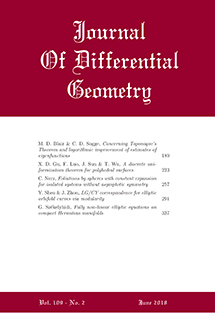Abstract
Gromov–Witten invariants of real-orientable symplectic manifolds of odd “complex” dimensions; the second part studies the orientations on the moduli spaces of real maps used in constructing these invariants. The present paper applies the results of the latter to obtain quantitative and qualitative conclusions about the invariants defined in the former. After describing large collections of real-orientable symplectic manifolds, we show that the genus $1$ real Gromov–Witten invariants of sufficiently positive almost Kahler threefolds are signed counts of real genus 1 curves only and, thus, provide direct lower bounds for the counts of these curves in such targets. We specify real orientations on the real-orientable complete intersections in projective spaces; the real Gromov–Witten invariants they determine are in a sense canonically determined by the complete intersection itself, (at least) in most cases. We also obtain equivariant localization data that computes the real invariants of projective spaces and determines the contributions from many torus fixed loci for other complete intersections. Our results confirm Walcher’s predictions for the vanishing of these invariants in certain cases and for the localization data in other cases. The localization data is also used to demonstrate the non-triviality of our lower bounds for real curves of genus $1$ in the present paper and of higher genera in a separate paper.
Funding Statement
P.G. was partially supported by ERC grant STEIN-259118.
A.Z. was partially supported by NSF grant DMS 1500875 and MPIM.
Citation
Penka Georgieva. Aleksey Zinger. "Real Gromov–Witten theory in all genera and real enumerative geometry: computation." J. Differential Geom. 113 (3) 417 - 491, November 2019. https://doi.org/10.4310/jdg/1573786971





